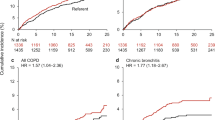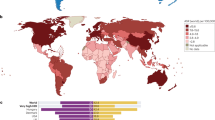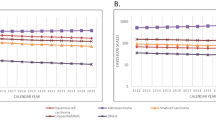Abstract
EVERY cigarette smoker does not develop lung cancer and so factors other than smoking must determine whether or not this disease develops. I have been investigating the possibility that hormones are involved in the development of lung cancer, and have measured the content of individual and total 17-oxosteroids and total 17-hydroxycorticosteroids (17-OHcs) in the urine of patients and controls. I found that patients with lung cancer excreted less androsterone (3α-hydroxy-5α-androstan-17-one), compared with its 5β-isomer aetiocholanolone, and more 17-OHcs than normal subjects1. Low androsterone excretion in patients with lung cancer had been reported before2. The mean ratios of androsterone to aetiocholanolone and of androsterone to 17-OHcs in eighty-four patients were significantly (P < 0.00001) lower than those of 100 normal men and of fifty-two control patients with chest diseases other than lung cancer (hospital controls). In fact the ratio of 17-OHcs to androsterone can be used as a diagnostic test for lung cancer with an accuracy of about 90% (Fig. 1). When the differences between cancer patients and controls were combined by linear discriminant analysis1, more than 90% of patients had negative discriminant scores whereas more than 90% of normal men had positive scores.
This is a preview of subscription content, access via your institution
Access options
Subscribe to this journal
Receive 51 print issues and online access
$199.00 per year
only $3.90 per issue
Buy this article
- Purchase on Springer Link
- Instant access to full article PDF
Prices may be subject to local taxes which are calculated during checkout
Similar content being viewed by others
References
Rao, L. G. S., Lancet, ii, 441 (1970).
Marmorston, J., Weiner, J. M., Hopkins, C. E., and Stern, E., Cancer, 19, 985 (1966).
Greenstein, P., The Biochemistry of Cancer (Academic, New York, 1954).
Mason, J. W., Psychsom. Med., 30, 576 (1968).
Cooke, J. N. C., James, V. H. T., Landon, J., and Wynn, V., Brit. Med. J., 1, 662 (1964).
Azzopardi, J. G., Freeman, E., and Poole, G., Brit. Med. J., 4, 528 (1970).
Jones, J. E., Shane, S. R., Gilbert, E., and Flink, E. B., J. Clin. Endocrinol., 29, 1 (1969).
Furman, R. H., and Howard, R. P., Metabolism, 11, 76 (1962).
Rao, L. G. S., and Hewit, M. L., Lancet, ii, 1063 (1970).
Thornes, R. D., in Endogenous Factors Affecting Host-Tumour Balance (edit. by Wissler, R. W., Dao, T. L., and Wood, S.), 255 (University of Chicago, Chicago, 1967).
Dao, T. L., in Endogenous Factors Affecting Host-Tumour Balance (edit. by Wissler, R. W., Dao, T. L., and Wood, S.), 75 (University of Chicago, Chicago, 1967).
McNamara, J. J., Varon, H. H., Paulson, D. L., Shah, I., and Urschael, H., J. Thorac. Cardiovasc. Surg., 56, 371 (1968).
Author information
Authors and Affiliations
Rights and permissions
About this article
Cite this article
RAO, L. Lung Cancer as an Endocrine Disease. Nature 235, 220–222 (1972). https://doi.org/10.1038/235220c0
Received:
Revised:
Issue Date:
DOI: https://doi.org/10.1038/235220c0
Comments
By submitting a comment you agree to abide by our Terms and Community Guidelines. If you find something abusive or that does not comply with our terms or guidelines please flag it as inappropriate.



